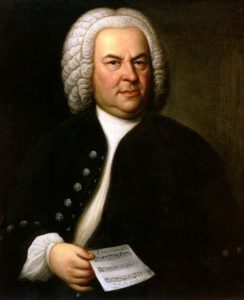4. Bach’s contribution to Dutch GDP (21-3-2020)
Bach’s contribution to Dutch GDP (21-3-2020)
Written by Jan Luiten van Zanden

Johann Sebastian Bach (1685-1750), in a portrait by Elias Gottlob Haussmann, copy or second version of his 1746 canvas. The original painting hangs in the upstairs gallery of the Altes Rathaus (Old Town Hall) in Leipzig, Germany.
Today is Bach’s 335th birthday. One of the big mysteries is that he did not get much appreciation and praise during his lifetime. Composers who nowadays have a similar status, such as Beethoven, Mozart and Händel, were big stars performing for kings and large audiences. By contrast, when Bach applied for the job of musical director of the city of Leipzig in 1722, was ranked no. 3, behind two other candidates with, in our view, modest reputations. He only got the job because no. 1 and no.2 both declined! During his years in Leipzig, when he was composing and performing the best music ever made (according, for example, to the Dutch classical top 300), no one noticed! Nobody saw his brilliance, the depth of his music, the beauty of his songs. There is not a single review of the amazing music that was performed. Bach historians have studied letters and diaries of people who were there in the Thomaskirche when the great passions of Bach were staged but did not find a single quote praising the new music. The only feedback that the poor man received was complaints by members of the city government that his music was too dramatic for the Church service. Did he know himself how wonderful his music was? Could he have any idea that 335 years later people would almost religiously perform his passions and cantates?
It is possible to estimate the contribution that Bach is still making to GDP. Economists do this via surveys, asking people to specify the value of certain free services that they enjoy (how much would you be prepared to pay for Google search, or for Facebook). For a devoted segment of the Dutch population, Bach is a basic need, so they would probably be happy to pay a lot for his music. My guess is that the share that Bach’s music is contributing to GDP (and consumer surplus) is higher than that of any other (dead) artist. I can’t do the surveys, but have a substitute measure: the number of hits on Google. I assume that hits reflect impact – the number of websites and places where the person involved is mentioned. When I type in Bach, I get 287 million hits; Mozart scores 146 million and Beethoven (who is enjoying an anniversary this year) ‘only’ 92 million (his two competitors in 1722, Telemann 4 million and Fasch less than one million, indeed reflecting their true status). Händel is a bit difficult as his name in English is often spelled Handel, which includes a lot of hits unrelated to the composer, but his German name gives about 8 million hits. But Bach can also refer to other members of the Bach family, and literally means brook, which may help as well. Including first names and/or initials leads to 81 million hits for both Beethoven and Bach, and 70 for Mozart. Compare this with Shakespeare: 154 million; Beatles: 160 million (John Lennon 80 million); Van Gogh: 79 million, Marx: 116 million, or Leonardo da Vinci 176 million. Music, however, is different from enjoying a painting by Van Gogh or reading Das Kapital, and I wonder they (still) have the dedicated supporters who would be willing to sacrifice money for that pleasure. My estimate is that Bach is the dead artist who still contributes most to current Dutch GDP (and even more to multi-dimensional well-being for that matter). But I may be somewhat biased.
Continue reading: Church Building in the Middle Ages – and the power of the referee (23-3-2020)
Addendum
A brief technical note: what these studies are measuring is the share of a certain service to GDP plus the consumer surplus, as literally the share of Google Maps to GDP is zero, as it is a service with a zero price – and the same applies obviously to Bach, whose music is also ‘priceless’. See for example:
Brynjolfsson E, Collis A, Diewert WE, Eggers F, Fox KJ. (2019). “GDP-B: Accounting for the value of new and free goods in the digital economy.” NBER Working Paper (National Bureau of Economic Research, Cambridge, MA)

